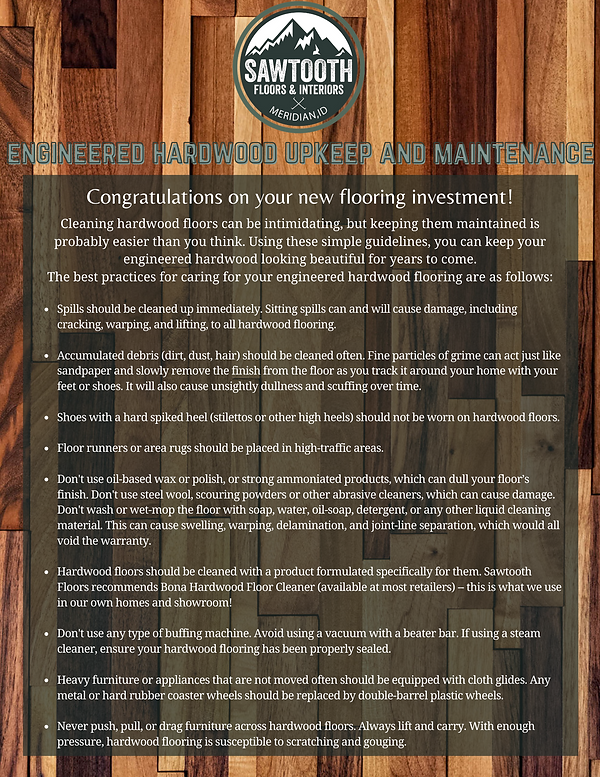

ENGINEERED HARDWOOD
Engineered wood flooring looks very similar to solid hardwood flooring on the surface. However, engineered wood flooring is made from a relatively thin layer of hardwood bonded over a substrate of high-quality plywood. The hardwood layer is generally about 3-7mm thick, but comes in thicknesses up to 15mm thick. Engineered flooring is generally less expensive than solid hardwood, due to only a thin layer of wood making up a small part of the 1/2", 5/8", or 3/4" thick plank (the rest being plywood). Most types of engineered hardwood can be sanded and refinished only once since the surface hardwood layer is relatively thin. A good-quality engineered wood floor typically lasts 25 to 50 years; once the wood layer has been worn or sanded through the floor is no longer able to be altered and should be changed.
Due to engineered flooring being prefinished, pre-sanded, and pre-stained before installation, it is also less "messy" to install and this sometimes makes engineered wood flooring more desirable to homeowners looking for the beauty of wood without the installation mess caused by sand and finish
(solid raw wood) floors.
Engineered wood flooring will increase your property's value by an estimated 3-5%, and is a desirable choice for many homeowners. There is not much of a difference in installing solid vs. engineered as far as property values go, and engineered flooring can be a way for property owners to get hardwood floors with a smaller budget. You can expect to recoup about 70-80% of your investment into hardwood flooring. When choosing between engineered or solid hardwood, laminate, LVP, or tile, keep in mind that though wood has the highest ROI, any solid surface flooring is more desirable than carpet for prospective property buyers.
All wood flooring installers will recommend making sure your wood flooring is at your home 7-10 days before installation so your flooring can acclimate to the humidity and temperature fluctuations of your home or business. Engineered hardwood will swell in moist conditions, and contract as the area dries; however, the swelling and contracting happens on a much smaller scale than solid hardwood. The change in shape can alter the appearance of the floor. Warping, bowing, and cracking are not uncommon for floors that have not been properly cared for.
We've created a printable PDF of our care and maintenance guide that was written by wood flooring installers with decades of experience. Following the maintenance rules in our comprehensive guide will help you to protect your flooring investment, keeping it looking timeless and elegant for years to come. Unless you have been specifically told that you'll need to use Nu-Oil on your flooring (only specific Hallmark floors use Nu-Oil), you'll be just fine using our general engineered flooring guide.
If you have any questions, please contact us, either by calling our store or filling out a contact form for a flooring representative to discuss options.

